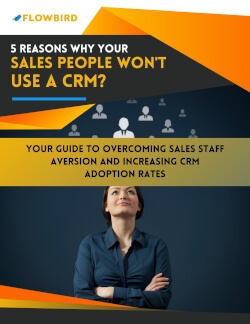There are different schools of thought on what makes a good sales mindset. However, our experience has taught us that a genuine interest in your prospects and customers will usually get you far.
The Management Shift by Vlatka Hlupic has some great insights into what makes a salesperson succeed. In the book, she lays out five levels in the Emergent Leadership Model:
- Level 1: Lifeless
- Level 2: Reluctant
- Level 3: Controlled
- Level 4: Enthusiastic
- Level 5: Limitless
A vital indicator of salespeople's success is their purpose. Those in the lower levels of the Emergent Leadership Model sell out of desperation as a means to an end simply because it's their job. On the other hand, salespeople at levels four and five sell to provide value to their clients.
The difference lies in their drive to sell. Good salespeople are not ruthless but meticulous about who they sell to and why.
If you adopt a value mindset and sell to meet the needs of your prospects (rather than to meet your sales goals), your results will be limitless.
In this article, we discuss the features of a good sales mindset. Adopt some of these to make better connections with your prospects and consequently improve your sales.
The sales mindset you need to adopt for success
Change your goal from selling to helping
If sales goals are your top priority, you need to rethink your sales mindset. It's easy to fall into the habit of purely aiming for sales, but it will not get you the best results.
Instead, your aim should be to help your prospects. The most successful salespeople have a genuine desire to help. This requires focusing on your prospects' challenges and asking them questions. Take an interest in who they are as people and decide whether your product or service will benefit them.
When a prospect objects to your offer, aim to resolve their concerns rather than immediately counteroffer.
Helping your prospects will lead to a mutually beneficial relationship. Prospects who understand and empathise with you are more likely to be open to your products or services.
Focus on the value you can bring to your customers
Value is critical to a good sales mindset! You mustn't be just selling for the sake of making sales. Good sales should benefit both you and your customers.
Consider how your product or service will benefit your prospect and use that as your focus.
Doing this should be clear whether or not a prospect will genuinely benefit from what you offer. If you don't think a prospect will find value in your products or services, you should be able to recognise when to leave them alone and move on to the next.
Be patient
While it can be tempting to rush your prospects to buy (and sometimes it is necessary to encourage them to move along the buyer's journey), you should generally avoid it. Putting pressure on a prospect will likely damage the relationship and prevent them from trusting you.
You must respect your prospects and their decision-making processes to nurture positive relationships.
Make a connection with your prospects
Good sales require good relationships.
Focusing on building a relationship rather than making a sale will help. For example, take a genuine interest in your prospect and try to help solve their problems. Avoid causing any tension. Position yourself as someone they can trust.
A good relationship can result in an initial sale, and the prospect is also more likely to become a lifelong customer.
Remember that no two prospects are the same.
Don't take emotions from previous interactions into conversations with new prospects. This will only lead to disappointment.
Consider each prospect a fresh start and get to know their situation. You need to be able to assess the situation for what it is and react accordingly.
Use positive language
Every time you talk to someone, the exact words you use subconsciously influence them. Be conscious of your comments and try to use positive language where you can rather than negative.
They might seem pretty similar, but when you break them down, you can see how people may react differently to each phrase. For example, 'you're welcome' is an excellent alternative to 'no problem'. The use of 'no' and 'problem' gives the phrase a negative spin, which you don't want when trying to build a strong foundation with a prospect.
A good sales mindset ultimately involves a genuine desire to connect with your prospects and solve their problems. Gone are the days of pushing sales on prospects that don't need your products or services.
A good sales mindset will get you far when paired with a streamlined sales process. We can help you bridge your sales and marketing efforts to ensure that every lead is accounted for. Contact us to find out how.
Are you struggling to get your salespeople to use your CRM system? Download our guide: 5 Reasons Your Sales People Won't Use A CRM.
